Disclosure: Meeple Mountain received a free copy of this product in exchange for an honest, unbiased review. This review is not intended to be an endorsement.
My friend Jacob was visibly upset. He had just read the manual’s flavor text for the setup of the game Mystic Paths, from R&R Games.
“I mean, what the **** man? Why not just use wooden pawns? Mystic Paths, my a**!!”
He wasn’t wrong. The theme for Mystic Paths is a complete miss, maybe the biggest miss of any game I will review this year—and it’s only January! The box makes Mystic Paths look like a fantasy adventure, when in fact, Mystic Paths is a codeword/clue-driven party game, not unlike the standard bearer for this type of game, the CGE classic Codenames.
And just like Codenames, Mystic Paths is a blast to play, especially if you don’t play it with seasoned hobby gamers looking to solve an intense Suchy/Pfister/Lacerda puzzle. I think the target audience for Mystic Paths is your family, your non-gamer spouse, maybe even your teenagers; with loads of gameplay options in the box, Mystic Paths is a bunch of fun, especially if you play with a group of people who you know personally.
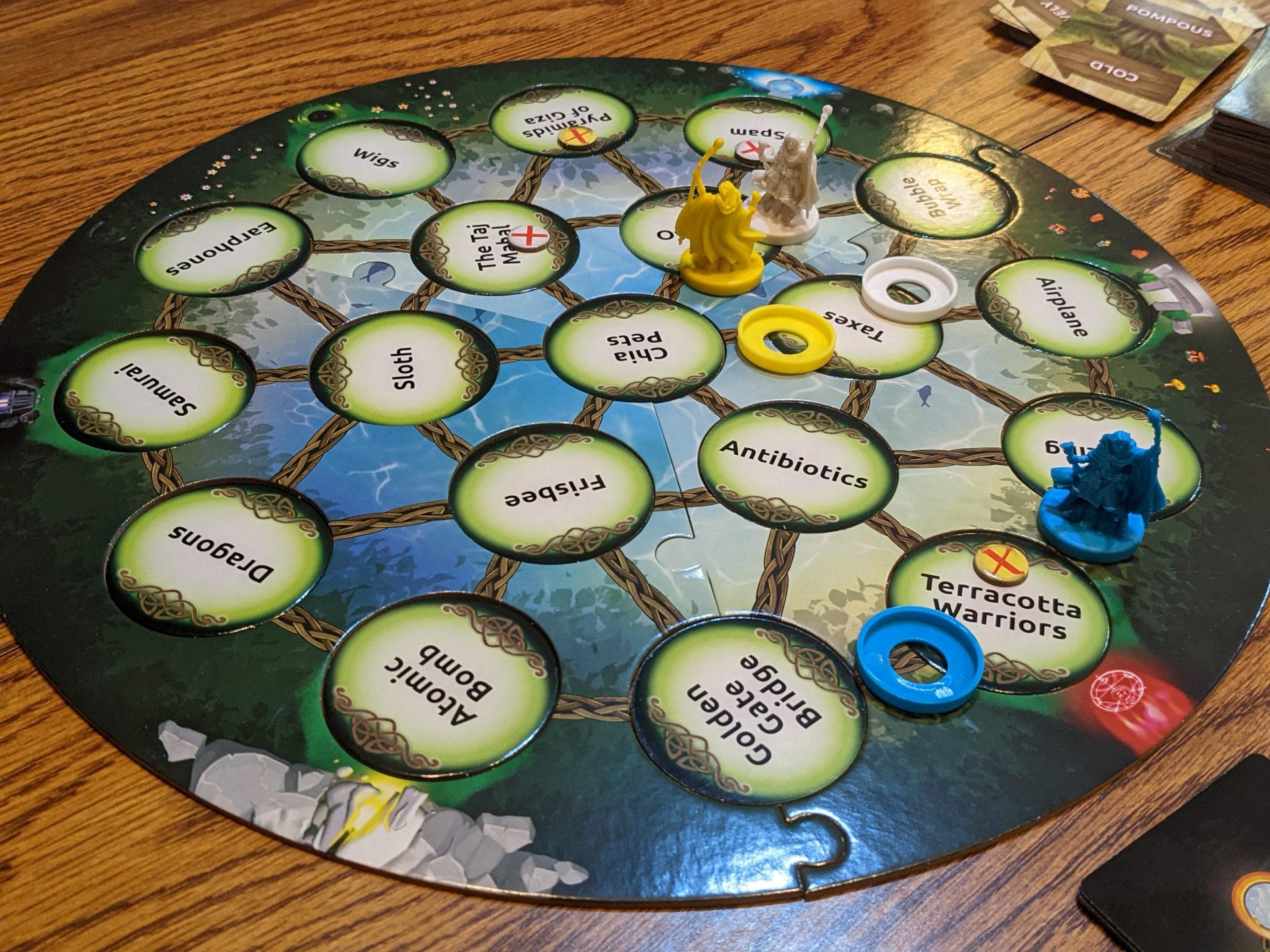
The Theme: It’s Hard to Get Around It
We need to just lay it out there: I have no idea what happened when Mystic Paths was in the development phase and someone came up with this hare-brained theme to apply to this design.
I can’t even make jokes here. I won’t pretend to have been a fly on the wall, navigating a meeting about what really happened when the decision was made to turn this word game into a journey through the Eternal Forest into the 4th Dimension (yes, really). There are Portals, and they are sealed with words from “our world”, and you need your friends to say them to open the Portals.
Based on this, you would think that the word “Coronavirus” would have not made the cut here. The same goes for “Water Bottles”, “Squash Surprise”, “Trolls” and “Bubbles.” But here we are, and Mystic Paths goes for broke!
Once you get past all of these issues, there’s a great game hiding in plain sight with Mystic Paths. The deal is simple: out of the 19 words on the table in a circular grid connected by short white lines, players must use their secret map card to chart a path hopping along 9 or 10 of these words. In a round, players will have a chance to guess up to 3 words which are in your specific path by looking at the clue cards you have laid on the table.which chart each player’s individual path. Over the course of 5 rounds, the player who gave the best clues will win.
Everything about this format is a blast. Using a deck of clue cards with 2 clues on each card, you’ll be able to steer the rest of your table towards your specific words by using some savvy word association. Each clue card can only provide one word as a clue for each step of your path, but you have a few “Not” tokens to reverse a clue to provide its opposite meaning. (A clue card with, say, “Hot” on it could be turned into “Not Hot” with the simple drop of an Not token, to point you towards a word like “Penguins.”)
And that’s only the base game: if you want to play competitively, you can do that. Team play? That’s here too. Or maybe you want to go for broke and do a challenge round format: one player has to run through 20 clues without making a mistake, and if that happens, you get to send R&R a copy of your words and clues to upload it to the company’s website. (This variant really seems to shine when it’s just you and your best friend/spouse/partner/roommate, with someone that really knows you.)
Mystic Paths doesn’t work with 2 players using the base game format; I’ve played Mystic Paths mostly at 4 players and that is where I think it really shines. Having people agree then disagree on your clue choices while trying to maintain your poker face is the heart of what makes Mystic Paths fun. Watching people think about your clues then talking them out of their choices is fantastic for the active player; in general, there are some cards that line up better for certain words on the main board than others, but usually the best clue giver will win a game of Mystic Paths.
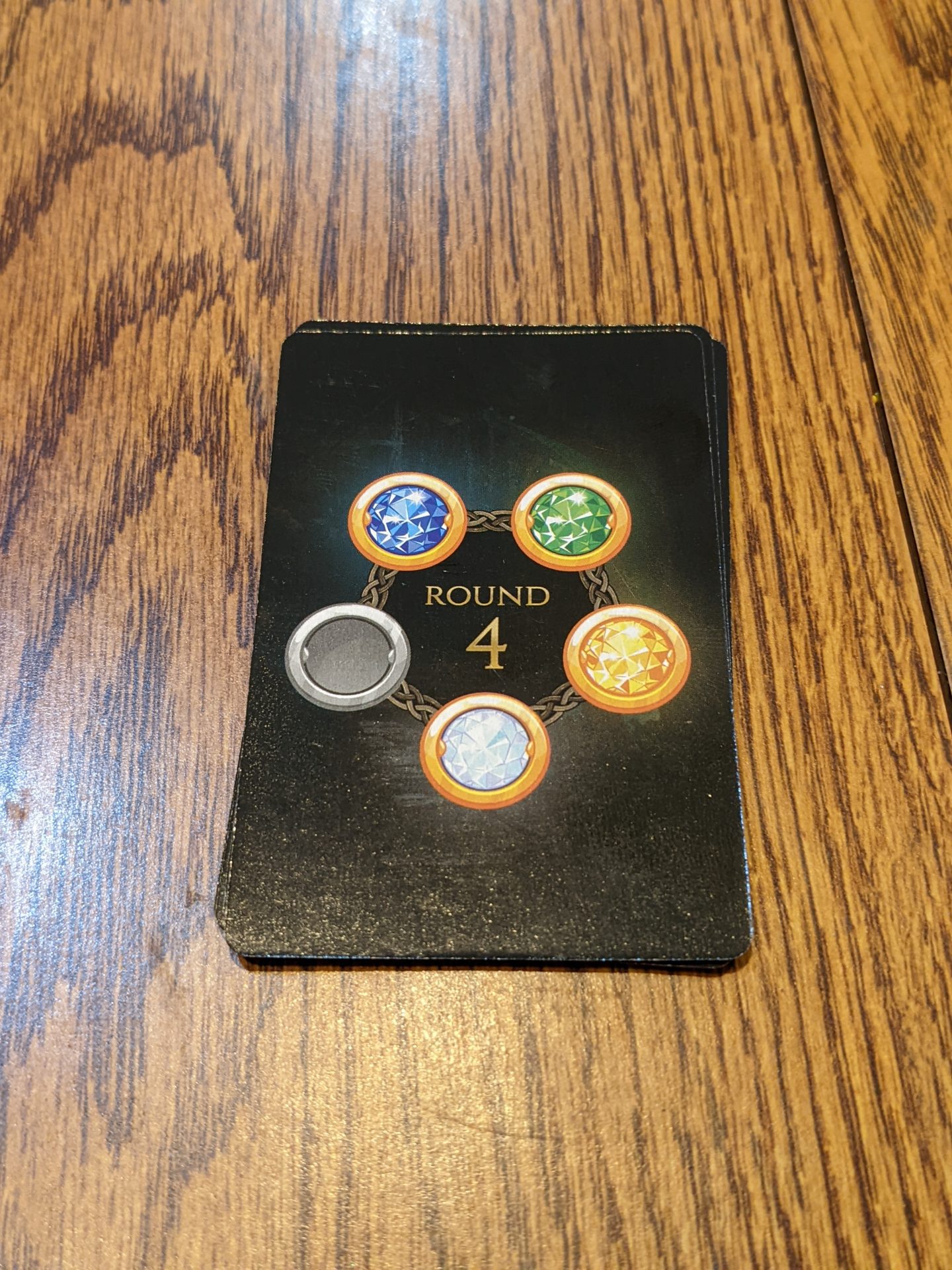
Dan, The Bits Are Fine!
When I spoke to Dan DiLorenzo from R&R at PAX Unplugged, he gave me the impression that R&R is not known for its high production value. And I will disagree with him there: Mystic Paths has cards on stock that work just fine, decent minis (certainly not exceptional, but serviceable), and an insert that works well for the tokens, discs, minis and cards in the base game.
One of my favorite new-to-me games of 2021 was Hansa Teutonica: Big Box, which even at $40 feels overpriced because it’s a box full of bland art and small wooden cubes. I mentioned Codenames from CGE above; I’ve never been completely blown away by CGE productions, and I respect that their prices align with this focus on tight gameplay instead of fancy bits.
Mystic Paths is an average box, with average art, and average minis for player pieces. I only have one quibble with the layout of the game: the board should have been bigger OR the pieces should have been smaller.
A bigger board would accommodate the larger player counts (Mystic Paths plays up to 6); as players move their pawns towards the center of the board, it gets crowded, and it can be difficult to read the words below/near each pawn. In my first 4-player game, we had a turn where 3 of the 4 pawns were on the exact same tile, and their bases were scattered on 3 other nearby spaces; just not a great look. I don’t need to make every turn Instagram-worthy, but I want to be able to clearly see each tile particularly between rounds when I am aligning cards for my new clues.
Smaller pieces would be my preference, though; imagine if Mystic Paths just used shorter pawns like the ones in Clue or any classic Milton Bradley/Hasbro game? And instead of a minis base to mark previous locations, a plastic ring took its place? A ring that encapsulated the outer ring of the previous space? Or dropping a cube the size of a Hansa Teutonica player piece instead? Neither of these would cover up the words, which is all I really care about.
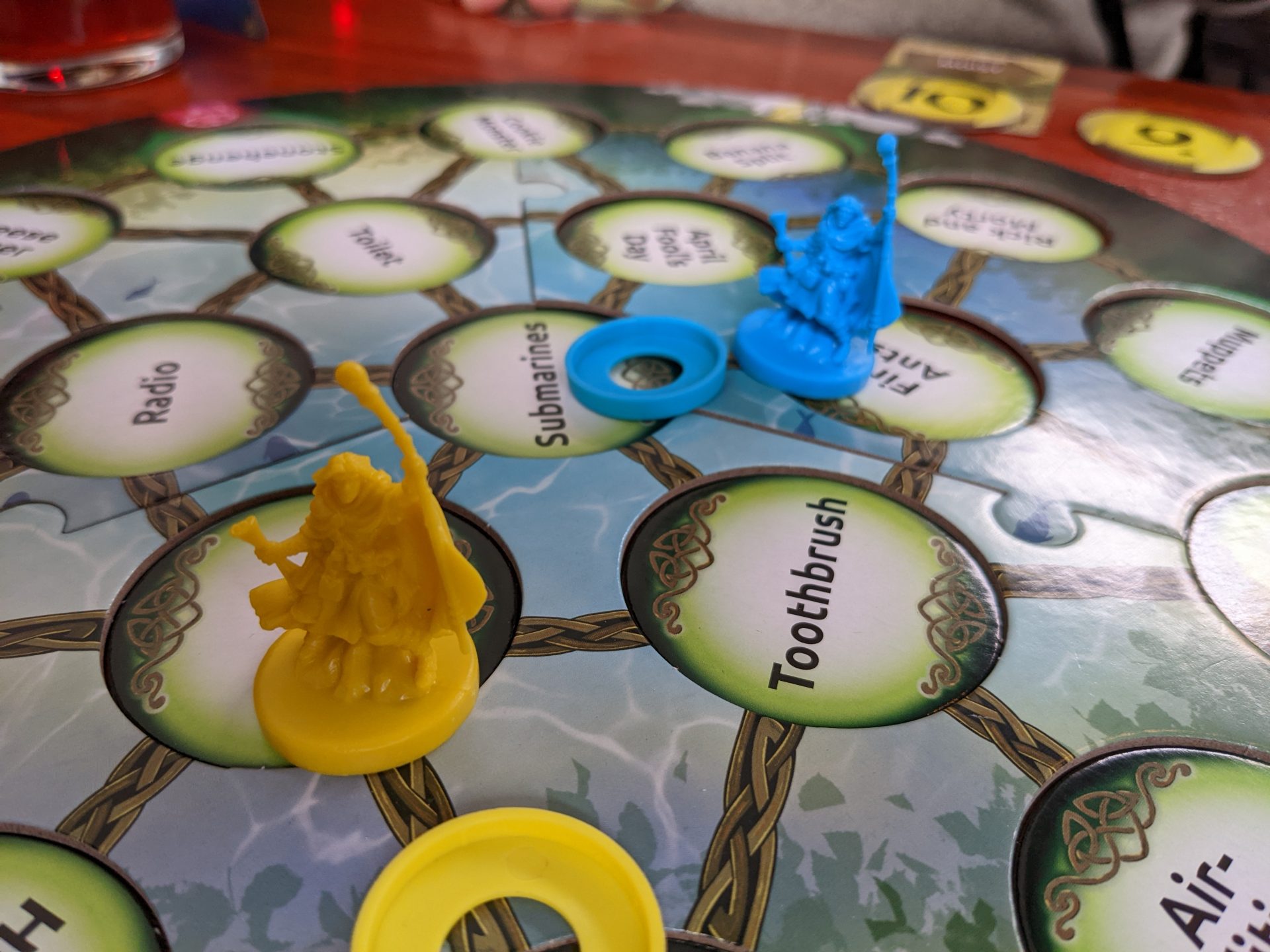
The Game is Fun, Just Forget About the Theme!
Mystic Paths lined up with my holiday travels perfectly: I got to play it twice with my core gaming groups before bringing it on 2 weeks of holiday travels to see family in upstate New York, and my family members appreciated this a lot more than the “gamers” I play with in Chicago.
Mystic Paths works best as a casual night in with a larger group. It plays up to 6 players and while I didn’t get a chance to play it at the full count, watching people fight over clues is incredible. The game doesn’t scale with larger groups↯—I would have appreciated needing 10 words to win at 2 or 3 players, but then a word or 2 less as the player count increases. That way, the game doesn’t take an hour to get through 60 words and 5 rounds with 6 players. An hour is just way too long for a light party experience.
The production doesn’t get in the way of a good time, but the theme really does. I found myself better off not even naming the game and jumping right into how to play, rather than trying to introduce the theme or any kinds of flavor text from the rulebook. (I did this with my first family game; at the end, my stepmother commented “Did you ever tell us the name of this game?”)
The theme just doesn’t work. Neither does the $40 MSRP for this game; it feels like a $20 party game with nicer production, but not enough to justify more than a $30 price point. At that number, the box really shines.
If you liked Codenames or games like it, you are going to love Mystic Paths. And the replayability is excellent: there are 60 double-sided tiles in the game, so with 120 words and the ability to only see 19 of them in a single game, you could make this your final party game purchase of the year.
My personal favorite play format in Mystic Paths is the “Go For It All” format where one player has to run through 20 clues in one shot. A great idea, and one that leads to plenty of hijinks with friends and family. If you can find the game for a reasonable price I highly recommend jumping in!


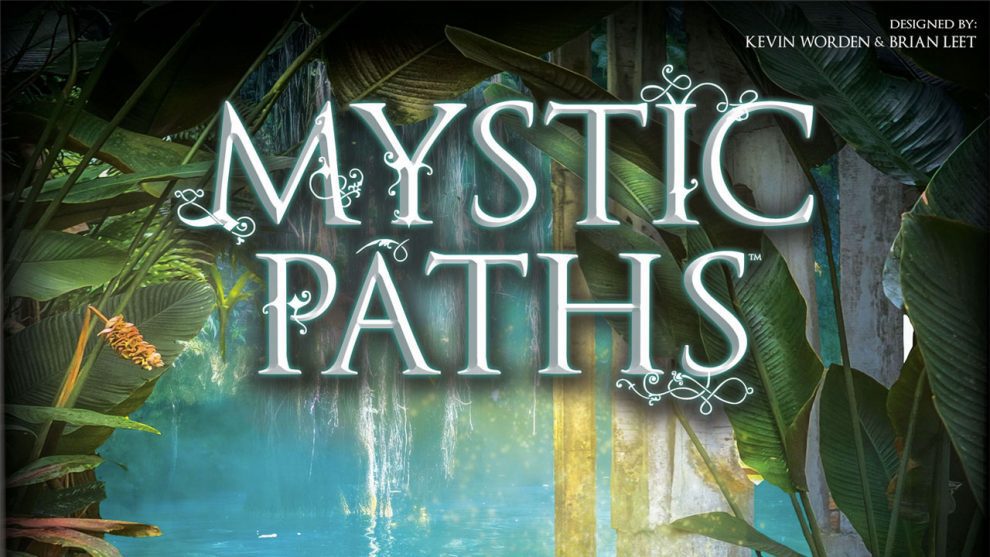



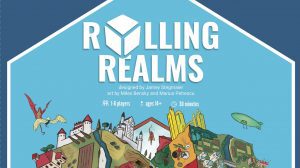
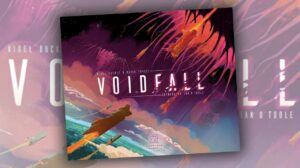




Add Comment